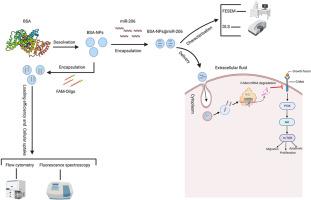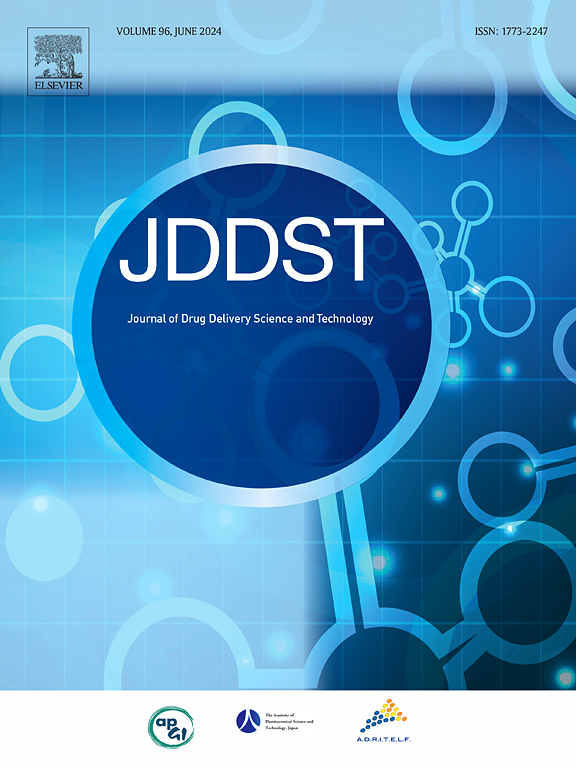miR-206-loaded albumin nanoparticles suppress ovarian cancer cells by inhibiting c-met oncogenic pathway
IF 4.9
3区 医学
Q1 PHARMACOLOGY & PHARMACY
Journal of Drug Delivery Science and Technology
Pub Date : 2025-09-17
DOI:10.1016/j.jddst.2025.107546
引用次数: 0
Abstract
Ovarian cancer is one of the most lethal gynecological malignancies, often diagnosed at advanced stages with poor survival outcomes. Despite improvements in surgery and chemotherapy, resistance to conventional therapies remains a major obstacle, underscoring the urgent need for novel and biocompatible therapeutic strategies. MicroRNA-206 (miR-206) functions as a potent tumor suppressor by targeting the c-Met/PI3K/AKT/mTOR signaling pathway; however, its therapeutic application is limited by instability, enzymatic degradation, and inefficient cellular uptake. We therefore hypothesized that bovine serum albumin nanoparticles (BSA-NPs) could serve as an effective and safe carrier for miR-206, enhancing its intracellular delivery and restoring tumor-suppressive activity in ovarian cancer cells. Consistent with this rationale, the nanocarriers exhibited favorable morphology, biocompatibility, and efficient cellular uptake, leading to elevated intracellular miR-206 levels. Functional assays demonstrated that BSA-NPs loaded with miR-206 inhibited proliferation, migration, and invasion while inducing apoptosis in SKOV-3 cells. Gene and protein analyses further confirmed suppression of c-Met/AKT/mTOR signaling, downregulation of oncogenic and anti-apoptotic markers, and restoration of tumor-suppressive regulators. These findings highlight BSA-NPs as a promising preclinical platform for miR-206 delivery, capable of reactivating tumor-suppressive pathways in vitro, and provide a strong rationale for further validation across additional models to overcome key barriers in the clinical translation of miRNA-based therapeutics for ovarian cancer.

负载mir -206的白蛋白纳米颗粒通过抑制c-met致癌途径抑制卵巢癌细胞
卵巢癌是最致命的妇科恶性肿瘤之一,通常在晚期诊断出来,生存结果很差。尽管手术和化疗有所改善,但对传统疗法的耐药性仍然是一个主要障碍,因此迫切需要新的生物相容性治疗策略。MicroRNA-206 (miR-206)通过靶向c-Met/PI3K/AKT/mTOR信号通路作为一种有效的肿瘤抑制因子;然而,它的治疗应用受到不稳定性、酶降解和细胞吸收效率低下的限制。因此,我们假设牛血清白蛋白纳米颗粒(BSA-NPs)可以作为miR-206的有效和安全的载体,增强其在卵巢癌细胞内的传递并恢复肿瘤抑制活性。与此基本原理一致,纳米载体表现出良好的形态、生物相容性和有效的细胞摄取,导致细胞内miR-206水平升高。功能分析表明,装载miR-206的BSA-NPs抑制SKOV-3细胞的增殖、迁移和侵袭,同时诱导细胞凋亡。基因和蛋白分析进一步证实了c-Met/AKT/mTOR信号的抑制,致癌和抗凋亡标志物的下调,肿瘤抑制调控因子的恢复。这些发现强调了BSA-NPs作为miR-206递送的一个有前景的临床前平台,能够在体外重新激活肿瘤抑制途径,并为进一步验证其他模型提供了强有力的理论依据,以克服基于mirna的卵巢癌治疗方法临床翻译中的关键障碍。
本文章由计算机程序翻译,如有差异,请以英文原文为准。
求助全文
约1分钟内获得全文
求助全文
来源期刊
CiteScore
8.00
自引率
8.00%
发文量
879
审稿时长
94 days
期刊介绍:
The Journal of Drug Delivery Science and Technology is an international journal devoted to drug delivery and pharmaceutical technology. The journal covers all innovative aspects of all pharmaceutical dosage forms and the most advanced research on controlled release, bioavailability and drug absorption, nanomedicines, gene delivery, tissue engineering, etc. Hot topics, related to manufacturing processes and quality control, are also welcomed.

 求助内容:
求助内容: 应助结果提醒方式:
应助结果提醒方式:


